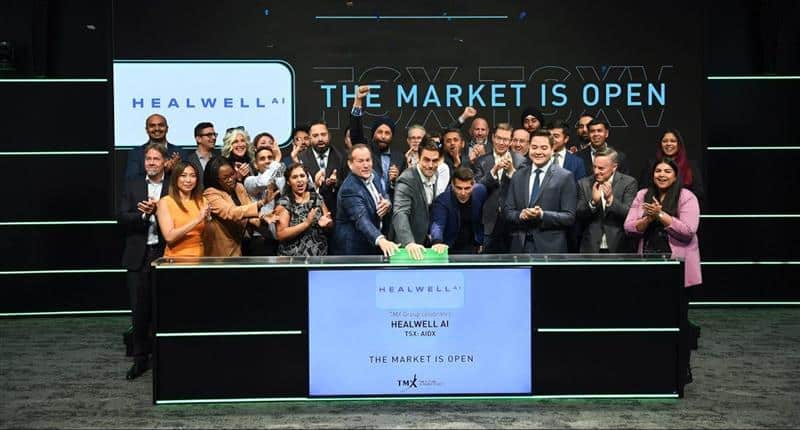

The startup mania in tech that took hold of the United States as a slow economic recovery set in following the crash of 2008 has been mirrored north of the border. In Canada, just like in Menlo Park and in dorm rooms up and down the Eastern seaboard, there are thousands of startups who want to be the next Instagram or Twitter.
Much of the reason for the sheer number of companies is that they are simply cheaper to start. And with customer facing social networks giving instant feedback, it takes much less time for founders to figure out if they have a winner on their hands or egg on their face. Over the next several years, this wave of tech will underscore how different the world of venture capital is Canada. Here, without bigtime VC’s to nurture them, startups are often forced to leave the nest early and seek public money by going public on the TSX Venture Exchange.
Many investors will know from firsthand experience that this route often does not work out, but the exchange does actually graduate a surprising number of companies to the big board, helping the TSX become one of the world’s premiere markets in recent years. And sometimes the venture exchange produces spectacular results, such as Catamaran Corp, which went public through a reverse-merger in the late nineties and went on to be named the fastest-growing company in America by Fortune magazine in 2011.
Angel investor Mike Edwards thinks he has a solution for investors who want exposure to what might be tomorrow’s game changing technology, but fear the all or nothing gamble that is an investment into a junior that may be not much more than a business plan and a quirky name. His LX Ventures (LX Ventures Stock Quote, Chart, News: TSXV:LXV) is a publicly traded company that launches, integrates and acquires high-growth technology companies. Cantech Letter’s Nick Waddell sat down with Edwards to talk about the new company.
Mike, Can you tell us a bit about your history before you started LX Ventures?
Sure. I’m an early stage tech entrepreneur and have over two decades of experience in the technology industry. In the past, I have built businesses through VC funding, public capital, and also bootstrapping. I think there is an emerging opportunity for early stage high-growth tech companies to take advantage of the public market. That is where LX Ventures comes in.
Why go public, isn’t this type of fund more traditionally private?
Private equity has been making record profits in the startup technology sector with massive exits, such as LinkedIn, Zyngna, Groupon and Facebook to name but a few. And these are only the companies that go public. The problem is that the public typically gets access to these companies only once they have undergone their rapid growth and have IPO’d at many multiples higher in valuation than the seed, angel and VC’s equity rounds. Much of the returns that Angel’s and VC’s have made in startup technology are through strategic acquisitions and never see the light of day for the public to get access to. Probably the most famous example is Instagram -18 months from being founded, they were acquired for $1-billion.

So, how does LX Ventures remedy that?
LXV is not a fund. We are a publicly traded company that launches, integrates and acquires high-growth technology companies. We are not passive investors and typically own a majority stake in the business. So, we are similar to InterActive Corp. (Nasdaq: IACI) in how it structures its subsidiaries. Much of the pure venture capital in Canada is put to work in the junior stock markets, and for about the last decade most of this capital has been ploughed into the resource sector. We are seeing a big pullback in this sector and much more interest in others including technology. We think our timing is perfect as the best performing sector (in terms of share price appreciation) on the TSX in 2012 was technology and it was the fast growing segment of new listings on the TSX Venture Exchange.
Can you walk us through how LX Ventures will make money, and the expected timelines?
Sure. We are currently internally innovating and acquiring companies that fit within our market verticals of FinTech, HealthTech and AdTech. We plan to have majority ownership in 9 perfectly positioned and expertly managed Silicon Valley-style startups that will provide both potential for 100X growth at exit and immediate revenues. An exit could be returned to shareholders in the form of a special dividend. Timing is hard to predict as this could happen at any time. Everyday we get inquiries into what we are working on. It comes with the territory of having many successful exits…they want to know what else you’re working on. We offer a compelling opportunity for investors to gain exposure to the technology sector at seed and angel valuations in companies that will have oversight from proven company builders.
We know the best case scenario is that one of your investments becomes the next Twitter or Facebook. What, do you think, is the worst case?
Worst case scenario is that a company fails and this will happen. That’s why we’re not a one-opportunity company. Look at how companies like Poynt or Contec Innovations fared on the TSX Venture. They failed and went bankrupt causing investors to lose their investment by investing in their one trick pony. By being diversified and not overly so, we stand a much better chance of success.
Can you tell us about some of the investments LX Ventures has already made?
Again, we’re not a fund so “investment” is not the most appropriate term, but some of our partners include a company called Battlefy, which is an online destination for gamers to play and watch e-sports (competitive play of video games). After profiting from hosting local gaming competitions, the founders moved Battlefy to Los Angeles to scale the monetization of e-sport leagues, catering to 300 plus million players worldwide. Another is Skyscraper, a digital advertising management solution for publishers that offers a drag-and-drop interface for placing advertisements on major Web publishing platforms like WordPress, Tumblr and Squarespace. Then there’s Weeve.it, which is a crowdfunding platform for non-profits which we recently acquired 100% ownership of. We are currently repurposing the platform for use in other industries that are ready for disruption.
What’s the structure of LX Ventures like? How much money do you have, how much are you burning?
We have about 30M shares outstanding with management owning about 40% of them. We raised our initial $2.2M seed funding in October 2012 and are burning about $50k a month not including our investments. Remember, we have many sources of non-dilutive money including service fees, company revenues, government funding and private equity investments in our underlying companies.
Do you expect to do a larger equity raise soon?
We’re not in a huge hurry. Our underlying subsidiary companies and strategic partners can receive funding outside of the public markets from the traditional sources of VC capital and at no dilution to LXV shareholders. For example, late last year, Skyscraper raised a $500,000 round led by Howard Lindzon of Social Leverage.

Can you tell us a bit about how you assembled your board and who they are?
Absolutely! We have assembled an expert team that comprises successful experience at every level of our business. Keir Reynolds, our Executive Chairman, brings a lot of public market experience and rolodex of investors to the table. He’s successfully operated in the volatile stock markets we’ve had the last several years. We both bumped into each other and were looking to solve the same problem but from opposite vantage points. It was one of those things that you look back on and realize just how important coincidences can be. Ray Walia, our COO, has been a real champion in setting up and managing Launch Academy, a non-profit pre-accelerator that provides vital office space and mentorship for startup entrepreneurs. Walia is extremely detail-oriented and holds almost as crazy office hours as I do. He is the perfect person to ensure the smooth day-to-day operation of LXV. Kevin Rathbun, our CFO, came highly recommended. Reynolds had worked with him on other successful public companies including Realm Energy that was bought out in a little more than 2 years from its formation. Derek Lew, Director, has been a longtime business partner of mine and backed me on Initio Group. With Initio’s success, he was ready to back me again. Brady Fletcher, who is a director, was a former investment banker with Canaccord Genuity that focused on financing publicly traded technology companies. His perspective is vital at the board level in assessing valuation and market fit.
You recently put together an advisory board. Can you tell me about that?
Sure, the first three members are David Baxby, co-CEO of Virgin Group; Lance Tracey, co-Founder and Chairman of Peer 1 Networks; and Reza Kazemipour, CEO of Oris4 and a veteran Silicon Valley executive with several successful company exits. We’re lucky to have all of these talents together in a focused manner to execute on the LXV’s strategy.
What kinds of milestones should investors look for from LX Ventures as signs that your plan is working?
That’s easy…through monetizing our portfolio of businesses by way of service fees, revenue growth and exits. We’re here to enhance shareholder value by way of building the next major must own company. My team has done it multiple times before with well over $2-billion in company exits and we think we’re far better equipped to do this today.
Leave a Reply
You must be logged in to post a comment.




 Share
Share Tweet
Tweet Share
Share




Comment